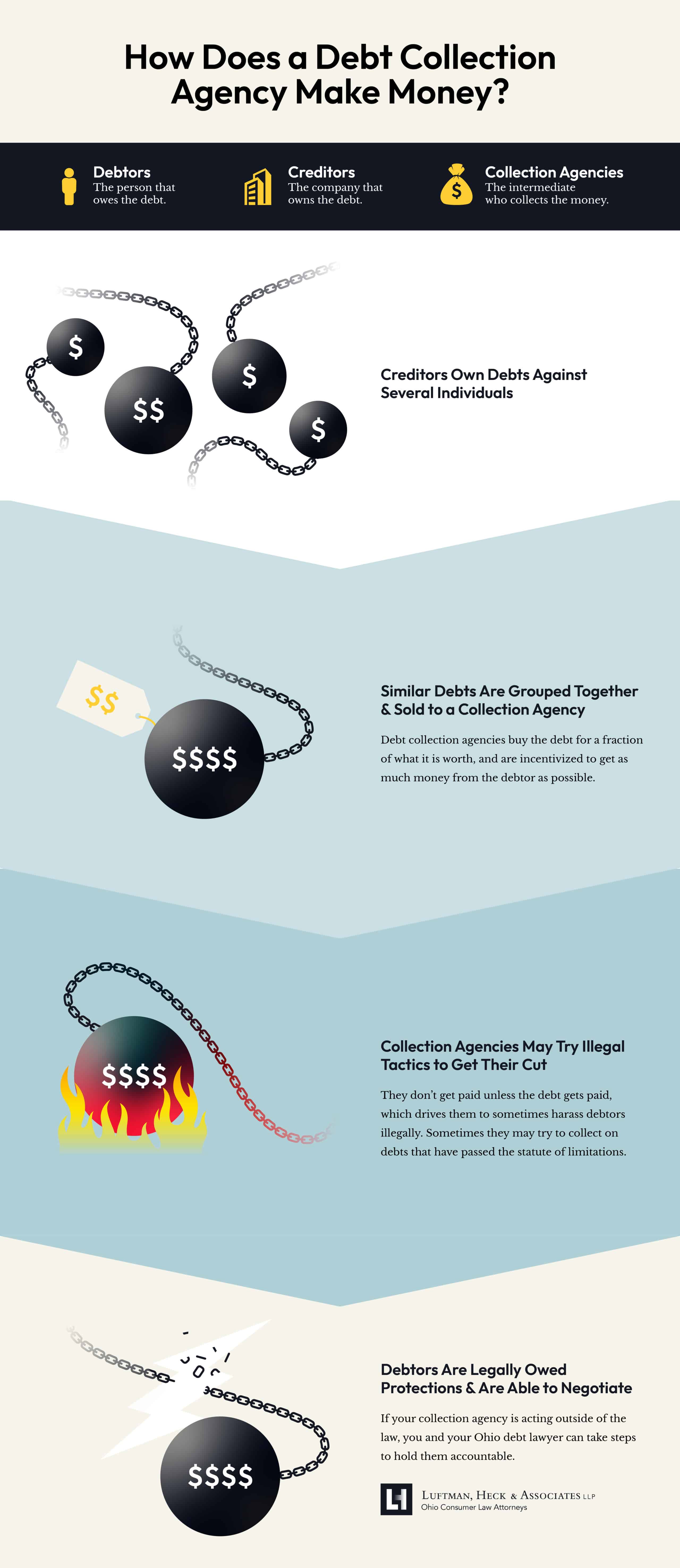Get Your 100% Free
Debt Relief Consult
How Does a Debt Collection Agency Make Money?
Debt collection agencies are, first and foremost, profit-driven businesses. Their goal is to make a profit by either working with creditors to collect delinquent debts or by purchasing the debts themselves – often for a fraction of the total amount owed– and then collecting on the debt. With this perspective in mind, debtors should be aware that, because their aim is to make a profit, debt collection agencies are often willing to push the limits when it comes to using aggressive collection practices that may not be allowed under federal and Ohio state law.
Therefore, consulting with an experienced Ohio debt lawyer may be necessary if you’ve been contacted by a debt collector so you can know how to effectively communicate with them and protect your rights.
Collecting For Creditors
Debt collection agencies often serve as intermediaries for creditors and, for a fee, collect delinquent debts on their behalf. These agencies will have a contract that often specifies that they only get paid when they recover money. Therefore, the more debt they recover, the more profit they earn. Under these contracts, debt collection agencies may be paid a substantial percentage of the amount they collect – up to 50 percent, in some instances. Creditors may also hire collection agencies to enforce judgments if they were successful with filing creditor’s lawsuits against debtors.
These debts are still ultimately owned by the original creditor. The creditor still determines when it deems a debt to be paid, and the creditor may authorize the collector to negotiate settlements with debtors for less than the full amount owed. Additionally, the creditor may authorize the collection agency to file a lawsuit against the debtor under certain circumstances.
A debt collection agency may also be authorized to tack on fees and penalties to the total amount owed and collect those additional charges from the debtor. These must be specified in the original credit agreement, which may state that if the debt goes into collections, the debtor must take responsibility for any collection expenses, interest, fees, and costs.
Collection Agencies that Buy Debt
A creditor may decide to sell a debt to a collection agency (or another buyer) if it determines that there is a low likelihood that it will be able to collect payment. Often, creditors bundle similar debt accounts and sell them for a fraction of the total amount – often mere cents for every dollar of debt. Generally, older debts are sold for much less because of the low likelihood of successful collection. There is also a risk in the purchase of older debts in the sense that they could very well fall outside the applicable statute of limitations, making collection efforts illegal. Additionally, if the debt is old, the information provided to the collection agency regarding the debtor may be outdated and inaccurate.
When a creditor sells a debt to a collection agency, it now owns the debt and has the freedom to negotiate settlements with debtors without the permission of the original creditor. The agency can also freely file a lawsuit if it decides that the debt is worth the trouble.
Contact an Experienced Ohio Debt Lawyer
If you have been contacted by a debt collection agency, you may need the assistance of a veteran and compassionate debt lawyer to protect your rights and ensure that the agency acts within the law. Debtors have protections under the federal Fair Debt Collection Practices Act and Ohio state law, and if you believe that the collector is acting illegally to try to maximize its profits, you and your Ohio debt lawyer can take steps to hold them accountable. The experienced consumer law attorneys at Luftman, Heck & Associates can help you navigate the complex laws and procedures involved in the debt collection process and negotiate with debt collection agencies.
Call us at (888) 726-3181 or email us at advice@ohiodebthelp.com for a free, initial consultation.

